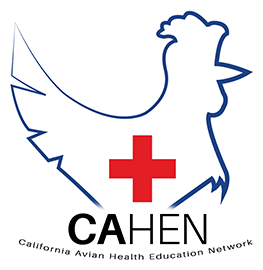California Avian Health Education Network (CAHEN)

In 2018, a substantial portion of Southern California’s backyard and commercial poultry flocks were significantly impacted by a devastating outbreak of virulent Newcastle Disease (vND) that lasted more than two years. The California Department of Food and Agriculture (CDFA) and United States Department of Agriculture (USDA) worked jointly to identify infections and halt rapid spread of the vND virus before its eradication midyear 2020. As a result of this outbreak and in an effort to prevent more in the future, CDFA established California Avian Health Education Network (CAHEN). This program is dedicated to offering education, training, outreach, testing, and vaccination options for backyard poultry flock owners, other bird enthusiasts, stakeholders, and everyone dedicated to avian health in Southern California. By working together, CDFA, USDA, University of California extension groups and community partners aim to keep California free of foreign animal diseases to prevent similar devastation in the future.
Vision
Prevention of need for large-scale regulatory response to an emergence of reportable avian disease, as required for the 2018-2020 virulent Newcastle Disease outbreak, through engaging community members and building effective partnerships between government agencies, academic institutions, avian health experts, bird enthusiasts, and various segments of associated industries; focused towards enhancing avian health, preventing foreign animal disease introduction, supporting immediate disease detection and ensuring rapid containment of disease.
Mission
A community-focused network of partnerships focused on prevention, early detection, and rapid containment of foreign animal diseases (FAD), such as those caused by virulent Newcastle and Avian Influenza viruses, in California domesticated bird populations. Achievement of the CAHEN vision through:
Prevention of outbreaks of FAD in birds through education, training, and outreach to community partners,
Early Detection of FAD by expansion of existing capabilities through consistent and targeted active and passive surveillance, and
Rapid Response to FAD outbreaks with specialized strike teams of personnel with established relationships within the community and related stakeholders
Goals & Strategies
Goals
Strategies
Education, Training and Outreach (ETO)
Surveillance Testing
Rapid Response to FAD (vND and avian influenza) Detection
Assurance and Certification Programs
Hobby Flock Quality Assurance and Certification Programs
Retail Feed Store and Pet Store Quality Assurance and Certification Program
Printable Handouts and Resources

